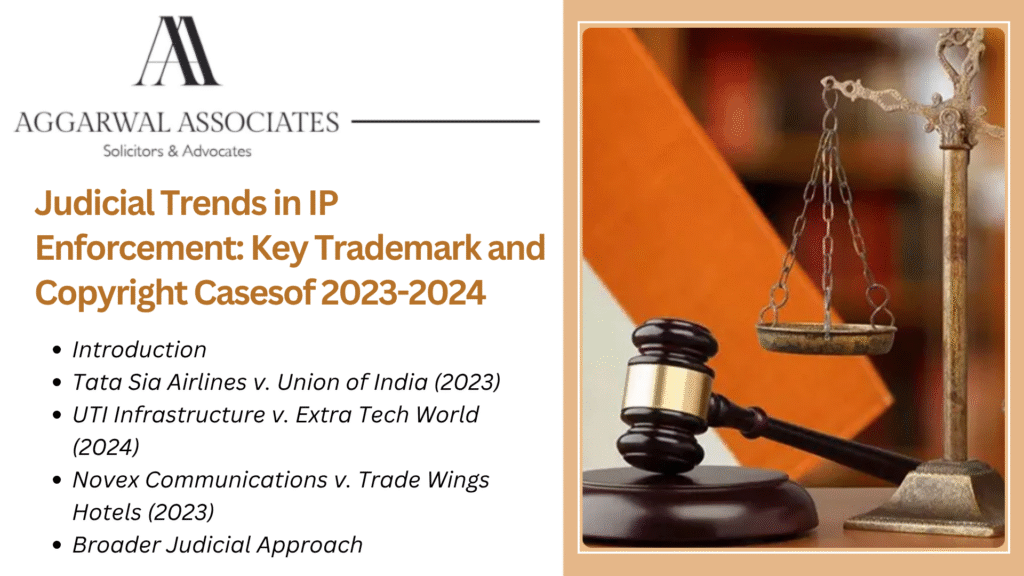Judicial Trends in IP Enforcement: Key Trademark and Copyright Cases of 2023-2024
Introduction

India’s judiciary plays a vital role in shaping intellectual property (IP) law, interpreting statutes, and setting precedents that guide enforcement. Between 2023 and 2024, several landmark trademark and copyright cases have clarified legal boundaries and strengthened IP protection in India. For businesses and creators, these rulings offer insights into safeguarding their brands and works amid rising disputes in a digital-first economy. This article examines key judicial trends from this period, focusing on notable decisions and their implications for IP enforcement.
Main Content
The past two years have seen Indian courts tackle complex IP issues, from well-
known trademarks to digital copyright infringement. Below are highlights of
significant cases and emerging trends:
1. Tata Sia Airlines v. Union of India (2023)
In this Delhi High Court case (2023:DHC:3659), Tata Sia Airlines sought to have its “Vistara” mark declared well-known under the Trade Marks Act, 1999, via a writ petition. The court declined, ruling that the formal process under Rule 124—including publication and a ₹1 lakh fee—could not be bypassed. It emphasized procedural adherence over judicial shortcuts.
Trend: Courts are reinforcing statutory processes for trademark recognition, signaling that businesses must invest in formal registration to secure “well-known” status, which offers broader protection against infringement.
2. UTI Infrastructure v. Extra Tech World (2024)
The Bombay High Court granted an ex-parte interim injunction in this case (SUIT (L) No. 537 of 2024) against entities running counterfeit websites mimicking UTI Infrastructure’s PAN card services. UTI alleged trademark passing-off and copyright infringement of its website content. The court acted swiftly to protect the plaintiff’s IP and public interest.
Trend: The judiciary is increasingly proactive against digital counterfeiting, reflecting the growing threat of online IP violations. This case underscores the importance of monitoring and swift legal action in the digital space.
3. Novex Communications v. Trade Wings Hotels (2023)
In a copyright dispute, the Bombay High Court ruled on Novex Communications’ claim over public performance rights for sound recordings. The court clarified that licensing entities like Novex must prove ownership or exclusive authorization under the Copyright Act, 1957, to enforce royalties, especially in commercial settings like hotels. Trend: Courts are scrutinizing the authority of copyright societies and licensees, pushing for transparency in royalty claims. This impacts how businesses negotiate licensing agreements for music and media use.
4. Broader Judicial Approach
Beyond specific cases, 2023-2024 saw courts adopt a balanced approach—protecting IP rights while ensuring fair use and public access. For instance, the Delhi High Court’s refusal to grant an injunction in a film adaptation case (Nayak novelization dispute) highlighted nuanced ownership issues in derivative works. Similarly, rulings on trademark dilution (e.g., Adidas’ three-stripe mark battles) emphasized evidence of consumer confusion over mere similarity.
Trend: Judicial restraint in granting injunctions reflects a focus on evidence-based outcomes, encouraging parties to build stronger cases rather than relying on presumptive relief.
These cases collectively illustrate a judiciary attuned to modern IP challenges—digital piracy, brand dilution, and licensing disputes. For trademark owners, securing formal recognition and monitoring online misuse are now critical. For copyright holders, proving ownership and authority in licensing chains is non-negotiable. The shift toward specialized IP benches in courts like Delhi and Bombay also signals faster, more expert-driven resolutions.
Conclusion
The judicial trends of 2023-2024 underscore India’s maturing IP enforcement framework. From reinforcing procedural rigor to tackling digital infringements, courts are shaping a robust yet balanced IP ecosystem. Businesses and creators must align their strategies with these precedents to protect their rights effectively. For tailored advice on trademark or copyright enforcement, reach out to our firm—we’re here to help you stay ahead in this dynamic legal landscape.
